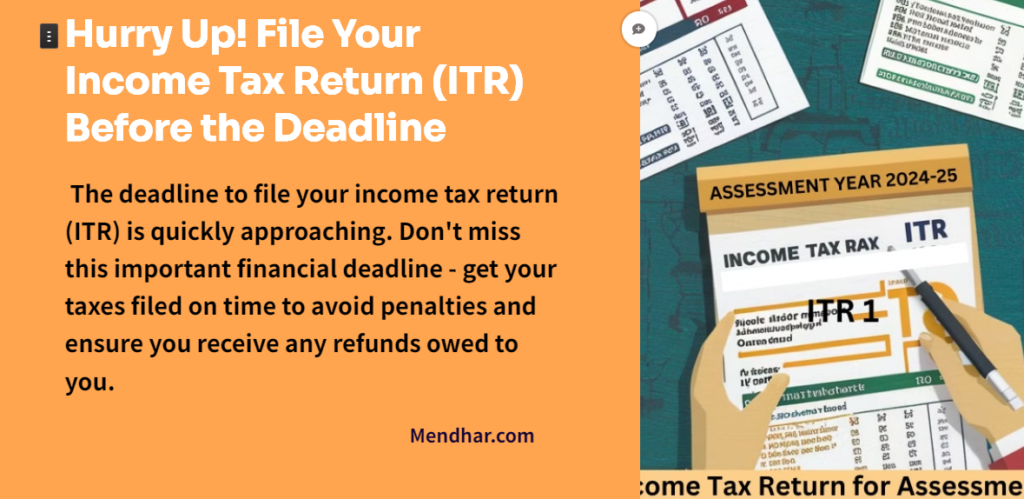Table of Contents
ToggleNot Filing Your Income Tax Return:Consequences
Filing income tax returns (ITR) is more than just a legal obligation; it’s a significant aspect of financial responsibility. With the assessment year 2024-25 underway, understanding the repercussions of not filing your ITR on time is crucial. This blog explores the various consequences of failing to file your ITR, emphasizing the importance of timely compliance.

Legal Repercussions and Penalties:
One of the most immediate and tangible consequences of not filing your ITR is the imposition of penalties and legal repercussions. According to the Income Tax Act, if you miss the deadline for filing your ITR, you can be fined up to ₹5,000. If you file after the due date but before December 31, the penalty is ₹1,000 for those with income up to ₹5 lakh. However, this penalty can escalate if the delay extends beyond this period. Moreover, under Section 234F, if you fail to file your ITR by the final due date, the penalty could go up to ₹10,000. This is not just a minor inconvenience but a significant financial burden that could have been easily avoided with timely compliance.
Apart from the financial penalties, there are legal consequences as well. Persistent non-compliance with tax filing can lead to more severe actions by the Income Tax Department, including the potential for prosecution. The department has the authority to initiate criminal proceedings against defaulters, which can result in imprisonment ranging from three months to two years, along with a fine. In cases where the amount of tax sought to be evaded exceeds ₹25 lakh, the period of imprisonment can extend up to seven years. These legal ramifications underline the gravity of not filing your ITR on time.
Loss of Carry Forward of Losses:
Another significant consequence of not filing your ITR is the loss of the ability to carry forward certain losses to future years. The Income Tax Act permits taxpayers to carry forward losses such as business losses, capital losses, and losses from owning and maintaining racehorses, which can be offset against future income. This provision helps in reducing the tax liability in subsequent years and can be a strategic tool for tax planning.
However, if you do not file your ITR within the due date, you forfeit the right to carry forward these losses. This could lead to a higher tax burden in future years as you won’t be able to offset your income with the losses incurred in previous years. For businesses and individuals who rely on this mechanism to manage their tax outflows efficiently, this could mean a substantial financial setback. It essentially negates the potential tax benefits that could have been leveraged, thus impacting long-term financial planning and stability.

Impact on Loan and Credit Applications:
Filing your ITR is not just a regulatory requirement but also a critical factor in financial credibility. Financial institutions, including banks and NBFCs, often require ITR receipts as proof of income and financial discipline when processing loan applications. Your ITR serves as a documented record of your income and tax payments, providing lenders with assurance of your repayment capacity.
Failure to file your ITR can severely impact your ability to secure loans. Without this proof, lenders may view you as a high-risk applicant, leading to rejection of your loan or credit card applications. Even if the loan is approved, it might come with higher interest rates due to perceived risk. This is particularly significant for self-employed individuals and business owners, for whom ITR serves as a primary income proof in the absence of a regular salary slip. Thus, non-filing of ITR can impede your ability to access credit, which might be crucial for personal or business needs.
Increased Scrutiny and Audits:
Another significant consequence of not filing your ITR is the increased likelihood of scrutiny and audits by the Income Tax Department. When you fail to comply with tax filing requirements, it raises a red flag, prompting the authorities to examine your financial activities more closely. This can lead to a detailed audit of your income and expenses, resulting in significant time and effort spent on explaining your financial transactions.
During an audit, if any discrepancies or unreported income is discovered, it can lead to additional penalties and interest on the overdue taxes. This process can be both stressful and financially draining, as it might require professional assistance from accountants or tax consultants to navigate the audit process effectively. Moreover, the scrutiny can extend to previous years’ filings, amplifying the potential penalties and liabilities. Hence, non-filing of ITR can inadvertently open the door to extensive and prolonged tax scrutiny.

Difficulty in Visa Processing:
In an increasingly globalized world, traveling abroad for work, education, or leisure is common. However, not filing your ITR can create obstacles in this regard. Many foreign consulates and embassies require ITR receipts for visa processing, particularly for long-term visas. They use these documents to assess the financial stability and the capacity of applicants to support themselves during their stay abroad.
Not having ITR receipts can lead to delays or even denial of your visa application. Countries like the United States, Canada, and the United Kingdom scrutinize the financial history of applicants rigorously. An incomplete or missing ITR record can raise red flags about your financial transparency and stability, complicating the visa issuance process. Therefore, non-filing of ITR not only affects your financial credibility domestically but can also restrict your mobility and opportunities globally.
Loss of Government Benefits and Subsidies:
The government offers various benefits and subsidies to eligible taxpayers, including those related to healthcare, education, and housing. Many of these benefits are linked to the regular filing of ITR, which acts as proof of income and eligibility. By not filing your ITR, you risk losing access to these subsidies and benefits, which can be a significant disadvantage, especially for individuals and families who rely on these aids to manage their expenses.
For instance, certain government schemes require the submission of ITR receipts to verify income levels and ensure that the benefits reach the intended beneficiaries. If you fail to file your ITR, you might be deemed ineligible for such schemes, impacting your access to essential services and support. This highlights the broader social and economic implications of non-compliance with tax filing requirements.
Conclusion:
Filing your ITR on time is a critical aspect of your financial responsibilities. The consequences of not filing your ITR for the assessment year 2024-25 can be severe, ranging from financial penalties and legal repercussions to loss of financial credibility, increased scrutiny, and missed opportunities for benefits and subsidies. It’s not just about avoiding penalties but about maintaining a healthy financial profile that supports your goals and obligations. Therefore, it is imperative to ensure timely and accurate filing of your ITR to safeguard your financial future and adhere to the legal requirements.
FAQ About Not Filing Your Income Tax Return:
Q1: What are the consequences of not filing your income tax return?
A1: Not filing your income tax return can result in penalties, legal repercussions, loss of the ability to carry forward losses, difficulty in securing loans, and issues with visa processing.
Q2: Are there financial penalties for not filing your income tax return?
A2: Yes, there are financial penalties for not filing your income tax return. You can be fined up to ₹5,000 if you miss the deadline, and if you file after December 31, the penalty can be as high as ₹10,000.
Q3: How does not filing your income tax return affect legal standing?
A3: Not filing your income tax return can lead to legal consequences, including potential prosecution. This can result in imprisonment ranging from three months to two years, or even up to seven years for significant tax evasion.
Q4: Can I carry forward losses if I have not filed my income tax return?
A4: No, if you have not filed your income tax return within the due date, you cannot carry forward losses such as business losses or capital losses to future years, affecting your ability to reduce tax liability in subsequent years.
Q5: How does not filing your income tax return impact loan applications?
A5: Not filing your income tax return can negatively affect loan applications, as financial institutions often require ITR receipts as proof of income. This can lead to loan rejection or higher interest rates due to perceived risk.
Q6: Will not filing your income tax return affect my visa applications?
A6: Yes, not filing your income tax return can complicate visa applications, as many foreign consulates require ITR receipts to assess financial stability. This can lead to delays or denial of visa applications.
Q7: What happens during an audit if you have not filed your income tax return?
A7: If you have not filed your income tax return, you may be subjected to increased scrutiny and detailed audits by the Income Tax Department. This can result in discovering discrepancies and additional penalties.
Q8: Can not filing your income tax return lead to loss of government benefits?
A8: Yes, not filing your income tax return can result in the loss of access to government benefits and subsidies, as many are linked to regular ITR filings to verify income levels and eligibility.


Pingback: Understanding Section 89 of Income Tax -
Pingback: Claiming Section 80U Exemption in ITR -